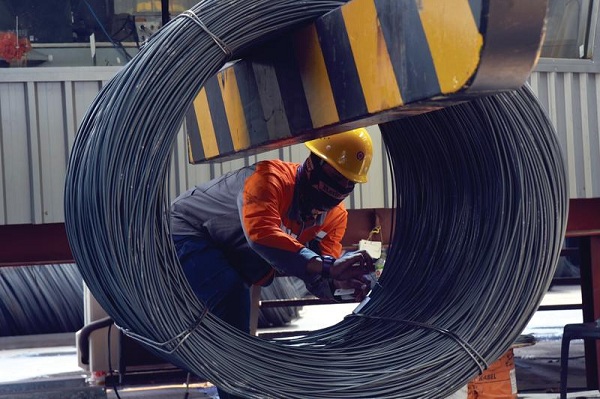
Sino-Malaysian investment ties bloom

A worker checks the product in a steel factory at the Malaysia-China Kuantan Industrial Park. (PHOTO PROVIDED TO CHINA DAILY)
With economic and trade cooperation between China and Malaysia gaining momentum, Malaysian businessman Beh Hang Kong is brimming with hope for the future of the China-Malaysia Qinzhou Industrial Park.
"Ever since the launch of the 'two countries, twin parks', the cooperation between Malaysia and China has increasingly deepened," said Beh, vice chairman of the China-Malaysia Qinzhou Industrial Park (Guangxi) Development Co, a joint venture entity that has promoted the CMQIP.
Launched in 2012, the CMQIP is located in the Qinzhou Port Area of the China (Guangxi) Pilot Free Trade Zone in South China's Guangxi Zhuang autonomous region. Together with its sister project Malaysia-China Kuantan Industrial Park, or MCKIP, in Malaysia's East Coast Economic region in Kuantan, Pahang state, the two parks represent a new model of "two countries, twin parks" for international cooperation on industrial parks.
Focusing on developing manufacturing, information technology and modern service industries, the CMQIP has a planned area of 55 square kilometers, with nearly half of the area fully developed. As of end-June, there were 5,861 companies in the park, including 40 foreign companies.
Noting that China became the largest source of foreign direct investment in Malaysia in 2020, Beh, who is also the director of the Malaysia-China Business Council, told China Daily that he is happy to see that under the leadership of both countries, Malaysia and China have formed mutual beneficial cooperation, providing opportunities for the industrial parks to grow.
China has been Malaysia's biggest trading partner for 12 consecutive years while Malaysia is also a major trading partner for China among member states in the Association of Southeast Asian Nations. In 2020, bilateral trade increased by 5.7 percent year-on-year to reach an all-time high of $131.16 billion, according to data from the General Administration of Customs of China.
"The CMQIP and the MCKIP should make use of the supporting policies provided by the governments and the friendly relations between the two countries," said Beh. He cited examples such as the Xiamen University Malaysia, the first overseas campus set up by a renowned Chinese university, and the New International Land-Sea Trade Corridor, a logistics passage connecting provinces in western China with Southeast Asian countries through the Beibu Gulf port in Qinzhou.
Mo Fuwen, deputy director-general of the administrative committee of the Qinzhou Port Area, said the total industrial output of CMQIP reached 7.4 billion yuan ($1.14 billion) in the first six months of 2021, an increase of 41.5 percent over the same period last year.
"A complete industrial chain of edible bird's nest is also taking shape," said Mo. He said more than 23 edible bird's nest companies have entered the industrial park, among which ten companies have been approved by the General Administration of Customs for importing and processing raw bird's nest, accounting for over 71 percent of the nation's total.
Edible bird's nests, highly valued by Chinese consumers for their nutritional and other health benefits, are made up of solidified swiftlet saliva.
Besides developing new cross-border industrial chains such as rubber products and new energy vehicles, Mo said the CMQIP will also work to cultivate new economies and industries.
"We will fully unleash the potential of the 'two countries, twin parks' model and the Belt and Road Initiative to prepare new projects in the industrial park," said Mo, adding that the port area committee will focus more on attracting targeted investment related to new energy vehicles, equipment manufacturing, digital information, biomedicine, and big data.
CMQIP's sister park in Malaysia also presents a great investment window for Chinese businesses to venture into Malaysia and the ASEAN market, according to Edward Chong Sin Kiat, chief financial officer and managing director of the IJM Land, a shareholder of the MCKIP. A main advantage of the park is the preferential policies offered by the Malaysian government, including full corporate income tax exemption for up to 15 years.
"To date, MCKIP has attracted 20 billion Malaysian ringgit ($4.79 billion) investment value and is targeting to create more than 10,000 local jobs," Chong told China Daily, adding that FDI in the industrial park will bring various benefits to the local economy through employment, knowledge and technology transfer, urban development and infrastructure.
Speaking at a promotion session for the twin parks during the China-ASEAN Expo on Sept 11, Malaysia's Deputy Minister of International Trade and Industry Lim Ban Hong said he hopes more investors from both countries will invest in the twin parks.
"The Malaysian government continues to welcome quality Chinese investments which will continue to enhance our technological capabilities, develop local supply chain and increase export revenues, in line with the National Investment Aspiration framework," Lim said in a keynote speech during the conference which bore the theme "Upgrading China-Malaysia's Two Countries, Twin Park Partnership”.
Lim also said the twin parks can focus more on investment projects related to palm oil, rubber, edible bird's nest, durian and halal food, and achieve a complementary cooperation model in supply and industrial chains, in order to help enhance the economic and trade relations between Malaysia and China.
Lim said the twin parks need to seize the strategic opportunity, deepen pragmatic cooperation, and explore new areas for cooperation, in order to generate win-win outcomes and benefits for people in both countries.
Noting that the MCKIP is the first industrial park that has been accorded the National Industrial Park status in Malaysia, Baidzawi Che Mat, chief executive of the East Coast Economic Region Development Council in Malaysia, said many infrastructure projects have been completed to support the MCKIP's development. This includes the expansion of the Kuantan Port as a deep water terminal to accommodate vessels up to 150,000 deadweight metric tons.
“The ongoing rail project will also further facilitate the flow of goods between ECER and the west coast of Peninsular Malaysia,” Baidzawi said at the same investment promotion conference on Sept 11.
The East Coast Rail Link, a major infrastructure project between China and Malaysia, runs from Malaysia's largest transport hub Port Klang and travels across the peninsula to Kelantan state in northeastern Malaysia, linking the country's less-developed region on the east coast to the economic heartland on the west coast. Construction is expected to be completed in 2026.
Though the pandemic has led to some China travel plans getting delayed, Beh, the vice chairman of the China-Malaysia Qinzhou Industrial Park (Guangxi) Development Co, is continuing his efforts to bring more Malaysian companies and products to the park in China.
He said he hopes to attract more emerging industries, such as biotechnology, artificial intelligence and new materials, to the industrial park in Qinzhou.
Noting that the entry requirement for Malaysian companies in the CMQIP is relatively high, Beh said he hopes a smaller area can be set up within the industrial park to allow companies that do not meet the requirement to invest there, bringing more quality products from Malaysia to the Chinese market.
Among the initiatives, Beh has coordinated engagement between The Associated Chinese Chambers of Commerce and Industry of Malaysia with the administrative committee in Qinzhou to develop a Malaysia Innovation Park.
Seeing the rising popularity of Malaysian durian among Chinese consumers, Beh said he has been working to establish a durian base or a “durian village” in the CMQIP. The facility will not only be a distribution center for durian but also involve a whole industrial chain for processing durian-related products.
China began to import whole frozen durian from Malaysia in 2019. Durian exports to China are expected to contribute nearly 500 million ringgit to Malaysia's total export value annually, according to Xinhua News Agency.
As for the sister park in Malaysia, Chong from IJM Land said he envisions the MCKIP to be the gateway for investors to enter the ASEAN region.
“Apart from its manufacturing focus, MCKIP is also set to become a leading logistics hub, driving import and export activities to a whole new level,” said Chong.
For example, phase three of the MCKIP is set to be transformed into Malaysia-China Kuantan International Logistics Park, which will further promote the Kuantan region to become an iconic economic center in ASEAN that effectively integrates export processing, international trade, cross-border e-commerce, warehouse logistics, and financial settlement, Chong said.
Contact the writers at kelly@chinadailyapac.com




